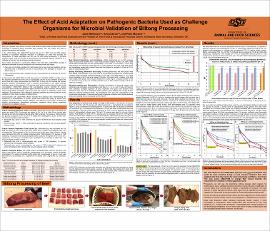| dc.contributor.advisor | Muriana, Peter | |
| dc.contributor.author | Wilkinson, Jade | |
| dc.contributor.author | Gavai, Kavya | |
| dc.contributor.other | Wentz Research Scholars | |
| dc.date.accessioned | 2023-05-25T15:45:26Z | |
| dc.date.available | 2023-05-25T15:45:26Z | |
| dc.date.issued | 2023-04-27 | |
| dc.identifier | oksd_wentz_2023_wilkinson | |
| dc.identifier.citation | Wilkinson, J., Gavai, K., Muriana, P. (2023) Effect of acid adaptation on pathogenic bacteria used as challenge organisms for microbial validation of biltong processing. Poster session presented at the Oklahoma State University Wentz Research Scholars Symposium, Stillwater, OK. | |
| dc.identifier.uri | https://hdl.handle.net/11244/337732 | |
| dc.description.abstract | Biltong is a South African dried beef product that has grown in popularity in U.S. markets over the last five years. Unlike traditional American beef jerky, biltong is dried at ambient temperature and humidity after marination. However, the United States Department of Agriculture Food Safety and Inspection Service (USDA-FSIS) requires the use of heat lethality and maintenance of 90% relative humidity in a sealed oven to accomplish adequate reduction of pathogens on dried beef products for consumption. If these parameters are not met, such as is the case with biltong processing, a microbial validation study must be provided to demonstrate sufficient bacterial
reductions of a ‘pathogen of concern’ can be achieved. Moreover, the use of acid-adapted cultures during validation studies for acidic foods is ‘highly recommended’ by USDA-FSIS. It is widely thought if challenge cultures are not acid-adapted prior to acidic treatment the culture may react by being overly sensitive and result in falsely high microbial reductions. With this, communication with USDA-FSIS officials indicates that research demonstrating the importance of acid-adaptation would move USDA-FSIS guidelines to require acid-adapted cultures for industry process validation. Research done in our laboratory directly addressed this issue by performing process validation studies using acid-adapted and non-acid-adapted Salmonella serovars and Listeria monocytogenes serovars for biltong processing to determine whether acid-adaptation is a necessary pre-culture treatment prior to microbial validation studies. The data using Salmonella
serovars disproves the USDA-FSIS approach that non-acid-adapted cells would be more sensitive during an acid process treatment than acid-adapted cells. However, this relationship was not clear when using L. monocytogenes serovars as a biltong processing challenge culture. | |
| dc.description.sponsorship | Lew Wentz Foundation | |
| dc.format | application/pdf | |
| dc.language | en_US | |
| dc.publisher | Oklahoma State University | |
| dc.rights | In the Oklahoma State University Library's institutional repository this paper is made available through the open access principles and the terms of agreement/consent between the author(s) and the publisher. The permission policy on the use, reproduction or distribution of the article falls under fair use for educational, scholarship, and research purposes. Contact Digital Resources and Discovery Services at lib-dls@okstate.edu or 405-744-9161 for further information. | |
| dc.title | Effect of acid adaptation on pathogenic bacteria used as challenge organisms for microbial validation of biltong processing | |
| osu.filename | oksd_wentz_2023_wilkinson.pdf | |
| dc.description.department | Animal and Food Sciences | |
| dc.type.genre | Poster | |
| dc.type.material | Text | |
| dc.type.material | Image | |
| dc.subject.keywords | biltong | |
| dc.subject.keywords | validation | |
| dc.subject.keywords | desiccation | |
| dc.subject.keywords | acid-adaptation | |
| dc.subject.keywords | Salmonella | |
| dc.subject.keywords | Listeria monocytogenes | |
